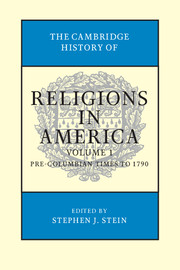Book contents
- Frontmatter
- Contents
- Contributors
- Editor's Introduction
- SECTION I BACKGROUND ON RELIGIOUS TRADITIONS – PRE-1500S
- SECTION II RELIGIONS IN THE POST-COLUMBIAN NEW WORLD – 1500–1680S
- SECTION III RELIGIOUS PATTERNS IN COLONIAL AMERICA – 1680S–1730S
- SECTION IV RELIGIOUS DIVERSITY IN BRITISH AMERICA – 1730S–1790
- SECTION V AMERICAN RELIGIONS IN THE EIGHTEENTH-CENTURY INTERNATIONAL CONTEXT
- SECTION VI THEMATIC ESSAYS
- 32 Religious Thought: The Pre-Columbian Era to 1790
- 33 Piety and Practice in North America to 1800
- 34 Sacred Music in Colonial America
- 35 Religious Architecture
- 36 Religion and Visuality in America: Material Economies of the Sacred
- 37 Religion and Race
- 38 Religions and Families in America: Historical Traditions and Present Positions
- 39 Religious History
- Index
- References
38 - Religions and Families in America: Historical Traditions and Present Positions
from SECTION VI - THEMATIC ESSAYS
Published online by Cambridge University Press: 28 July 2012
- Frontmatter
- Contents
- Contributors
- Editor's Introduction
- SECTION I BACKGROUND ON RELIGIOUS TRADITIONS – PRE-1500S
- SECTION II RELIGIONS IN THE POST-COLUMBIAN NEW WORLD – 1500–1680S
- SECTION III RELIGIOUS PATTERNS IN COLONIAL AMERICA – 1680S–1730S
- SECTION IV RELIGIOUS DIVERSITY IN BRITISH AMERICA – 1730S–1790
- SECTION V AMERICAN RELIGIONS IN THE EIGHTEENTH-CENTURY INTERNATIONAL CONTEXT
- SECTION VI THEMATIC ESSAYS
- 32 Religious Thought: The Pre-Columbian Era to 1790
- 33 Piety and Practice in North America to 1800
- 34 Sacred Music in Colonial America
- 35 Religious Architecture
- 36 Religion and Visuality in America: Material Economies of the Sacred
- 37 Religion and Race
- 38 Religions and Families in America: Historical Traditions and Present Positions
- 39 Religious History
- Index
- References
Summary
As fundamental and even venerable social institutions, religion and the family for centuries have enjoyed a close association. Both families and religions are approached with a special reverence; both offer to their members the possibility of merging selves and souls within a larger group; each harbors settings for important rituals of unity and continuity. Involvement in religions and in families can spawn similarly intense emotions; each can subdue or smother individual feelings and instead deposit the follower squarely in the swirl of ceremony – be it for a bar mitzvah or a betrothal, a baptism or a burial.
More than sixty years ago, Margaret Park Redfield insisted that, historically, families (and, she could have easily added, religions) provide for people
a sense of security derived from status in a group of which they are permanent members, initiate into a consistent mode of procedure so that there may be some standards for action and principles of right and wrong, and create an attachment to certain rituals which not only give color to life but also supply in certain areas of existence sacred rather than secular values.
The reasons for such close relations are as obvious as they are numerous. Religion and the family occupy adjacent and overlapping spaces in the private realm of modern existence. Yet neither is totally isolated in that sphere.
- Type
- Chapter
- Information
- The Cambridge History of Religions in America , pp. 804 - 824Publisher: Cambridge University PressPrint publication year: 2000

